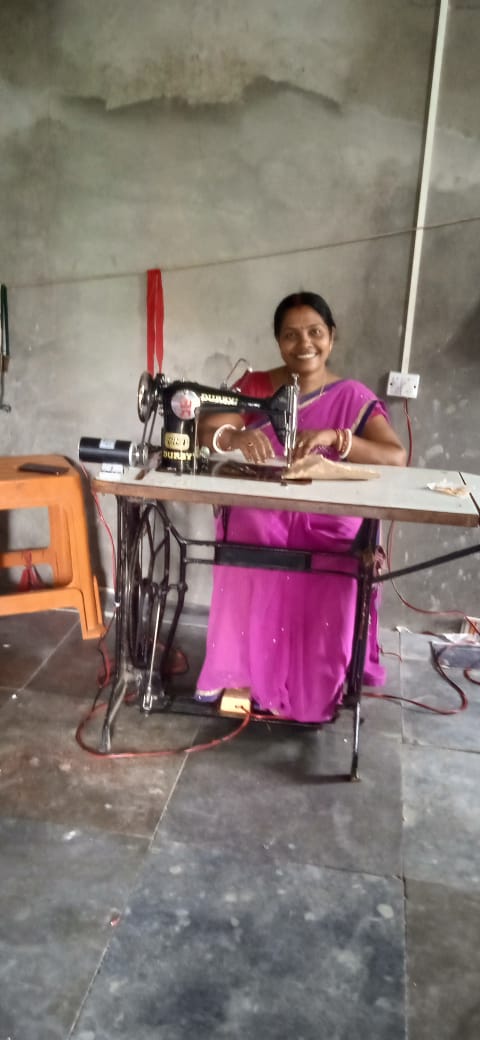Background
The Kalyana Karnataka Regional Development Board (KKRDB), earlier known as Hyderabad Karnataka Regional Development Board, was established in 2013. The board spreads over 6 districts -Bidar, Bellary, Kalaburagi, Koppal, Raichur and Yadgir and 40 assembly constituencies in the northern part of Karnataka. The districts were brought under Karnataka in 1956 when states were reorganised in India. The Kalyana Karnataka board looks to achieve inclusive growth and balance regional development in all of the 6 districts. The KKRDB sanctioned COVID relief funds to enable access to multifaceted livelihood programs for marginalized communities through empanelled NGOs and community based organisations. Sarvodaya NGO, which specializes in skill development and training, in partnership with SELCO Foundation successfully implemented 135 solar powered sewing machine interventions with end users. SELCO aims to replicate and implement the intervention, in partnership with KKRDB, across the region. SELCO Foundation helped procure machines and contributed 50% of the funds to support the uptake of solutions. The total project cost was INR 15,86,000. According to Sarvodaya’s qualitative survey data, the implementation model has led to improvements in food security, productive asset holdings (sewing machine), savings, and in some contexts improved psychosocial well-being. The program was implemented in Koppal and Bellary district. The approach aims to scale up the program under covid relief funds sanctioned by KKRDB under employment ge
Solution
The 4 components of the program include: Productive use asset: One-time transfer of a productive asset such as a sewing machine - as part of KKRDB existing covid program under covid relief fund for vulnerable women Technical skills training: Training to use and manage the productive asset in partnership with Sarvodaya Ngo Savings: Savings account access or encouragement to save Home visits: Frequent home visits by implementing partner staff to provide accountability, coaching, and encouragement The program so far has helped the marginalized women shift out of farm labour and into running their own tailoring businesses increasing their earnings after the productive asset transfer. SELCO Foundation plans to reach all the 6 districts and contextualize the model to cater to specific settings like in terms of provisioning required skill training.
Implications
The intervention/partnership with KKRDB highlights impact to foster support for replication and scale.
A qualitative survey to assess the impact of program intervention underscores improved psychosocial well - being and perceived a change in their economic lives.
Even though the loan component was zero, the program intervention does well to enable access to financing services. The women community under this program now have a source of income directly leading to bank accounts, savings and deposits otherwise absent.
The model program’s success and effectiveness has led us to consider how it could be further adapted. Additionally, this intervention particularly helped eliminate drudgery and created employment opportunities in remote areas. As of 2021, SELCO foundation (SF) and KKRDB have reached 135 women across 6 districts of karnataka.
Further, KKRDB is planning to expand its reach across Bidar, Yadgir, Raichur, Koppal, Kalaburgi, Ballavi and Vijaynagar. The results from this program intervention have spurred interest in further livelihood intervention expansion. SF and KKRDB are planning to optimize this program intervention in different solar compatible livelihood settings to create maximum employment opportunities and income generation in the 6 districts.
The Problem Statement
Extremely poor households often depend on insecure livelihoods (e.g. farming) and face a variety of impediments to sustainably transition out of poverty. The targeted beneficiaries here are women, from vulnerable segments (differently abled women, widows, sole providers) who have been trained for tailoring. These women have been identified with the support of local panchayats. Many of these women depend on insecure and fragile livelihoods, including casual farming and domestic labour. Their income is often irregular or seasonal, putting labourers and their families at risk of hunger. Self-employment is often the only viable alternative to menial labor for this segment of vulnerable women. Yet many lack the necessary cash or skills to start a viable business. To alleviate these constraints, KKRDB, Sarvodaya Ngo and SELCO foundation have partnered to support multifaceted solar compatible programs that foster a sustainable transition to more secure livelihoods. The motive is to set them on a sustainable trajectory out of poverty. Barriers: Ownership of productive use assets (SELCO enables asset procurement) One-off interventions that remove these barriers lead to sustainable poverty reduction
